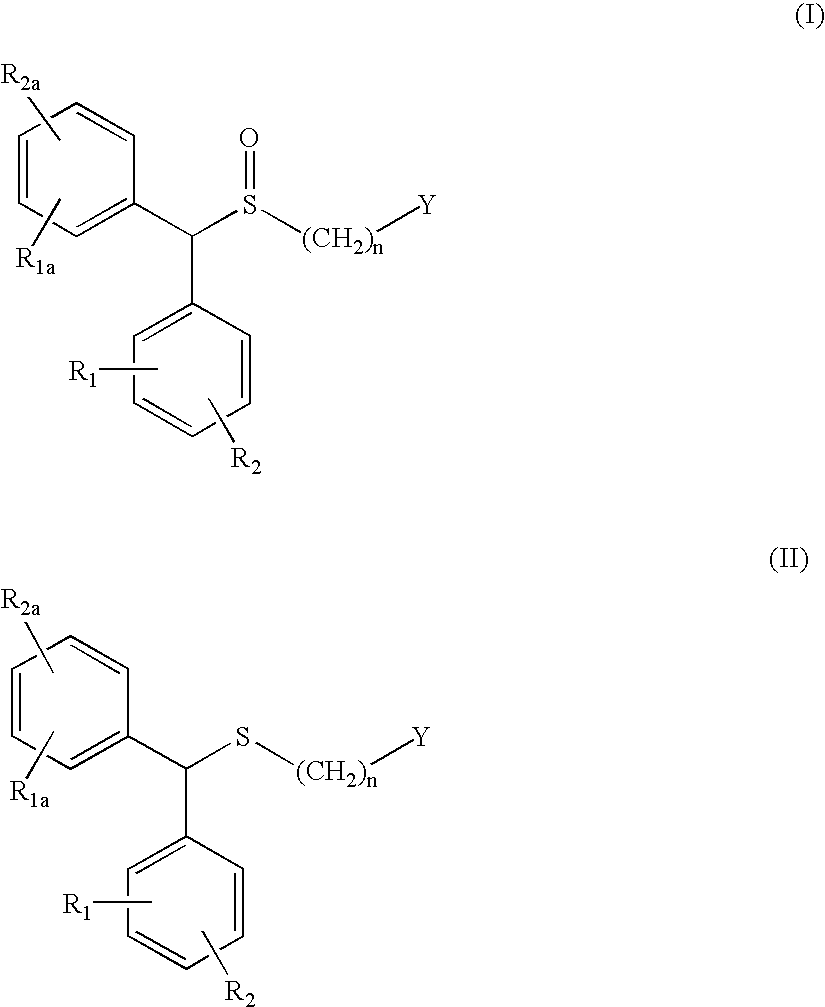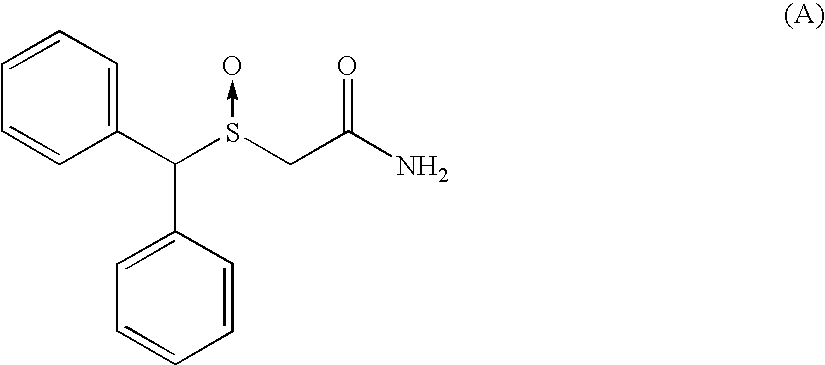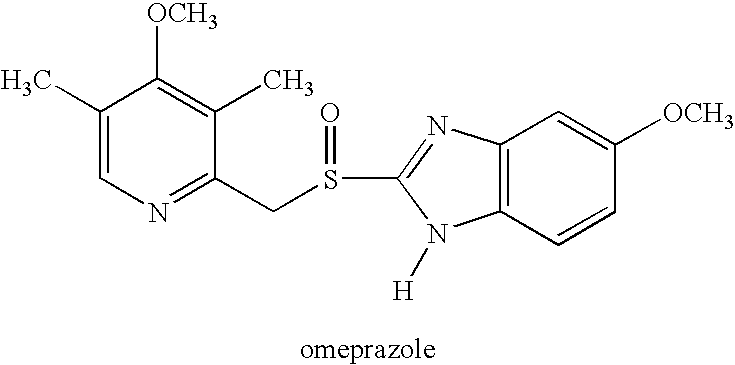Process for enantioselective synthesis of single enantiomers of modafinil by asymmetric oxidation
a technology of enantioselective synthesis and enantiomer enrichment, which is applied in the field of process for enantioselective synthesis of single enantiomers or an enantiomerically enriched form of modafinil, can solve the problems of poor yield of about 21% of racemic modafinic acid, and not solve the problem, and achieve high enantioselectivity and high yield
- Summary
- Abstract
- Description
- Claims
- Application Information
AI Technical Summary
Benefits of technology
Problems solved by technology
Method used
Image
Examples
examples
Material and Methods
Determination of the Enantiomeric Excess in the Examples and Comparative Examples
[0215] The enantiomeric excess value in each example given above gives an indication of the relative amounts of each enantiomer obtained. The value is defined as the difference between the relative percentages for the two enantiomers.
[0216] The enantiomeric composition of the obtained sulphoxide has been determined by chiral High Performance Liquid Chromatography (HPLC under the following conditions: [0217] Column: AGP (150×4.0 mm; 5 μm) [0218] Oven temperature: 40° C. [0219] Eluent: sodium acetate+0.5% n-butanol [0220] Flow: 0.9 ml / min [0221] Wavelength: DAD λ=230 nm
[0222] As an example: [0223] Retention time for the (−)-2-[(diphenyl)methylsulphinyl]acetamide: 6.5 min. [0224] Retention time for the (+)-2-[(diphenyl)methylsulphinyl]acetamide: 8.3 min.
or, [0225] Column: chiralpak AS (250×4.6 mm) [0226] Oven temperature: 40° C. [0227] Eluent: isopropanol / ethanol 85 / 15 [0228] Fl...
examples 1 to 16
Asymmetric synthesis of (−)-2-(diphenylmethyl)sulphinylacetamide
General Procedure for Examples 1 to 16
[0253] Diphenylmethylthioacetamide (7.70 g ; 0.03 mol ; 1.0 eq) was dissolved in the solvent (77 mL; 10 vol.). To the solution were added (S,S)-(−)-diethyl-tartrate (1.23 g; 0.006 mol; 0.2 eq) and titanium (IV) tetraisopropoxide (0.85 g ; 0.88 mL ; 0.003 mol; 0.1 eq) and water (27 μL minus the sum of water present in reactants and solvent already introduced ; 0.0015 mol ; 0.05 eq) at 55° C. In these conditions, the resulting chiral titanium complex has the stoichiometry (DET / Ti(OiPr)4 / H2O: 2 / 1 / 0.5) and corresponds to 0.1 eq with respect to diphenylmethylthioacetamide. Stirring was maintained at 55° C. during 50 minutes.
[0254] After cooling to room temperature (25° C.), were added to the mixture diisopropylethylamine (0.39 g; 0.52 mL; 0.003 mol; 0.1 eq) and cumene hydroperoxide (4.55 g; 5.0 mL; 0.03 mol; 1.0 eq).
[0255] After contacting during about an hour, the formed precipitate...
example 1
Influence of the Ratio of the Titanium Chiral Complex with Respect to the diphenylmethylthioacetamide on the enantioselectivity and the Purity of the Asymmetric Oxidation
[0257] In this experiment, the ratio of the titanium chiral complex with respect to the diphenylmethylthioacetamide was varied from 0.05 to 0.3 equivalent, the stoichiometry of the chiral titanium complex DET / Ti(O-iPr)4 / water: 2 / 1 / 0.4 being maintained constant, all the others parameters being as defined in the above general procedure. Experiments were performed in toluene.
TABLE 1Titanium complex / ScaleE.e.PurityYieldEntrysulphide (equivalent)(mole)(%)(%)(%)10.30 / 10.03>99.5>99.588.420.15 / 10.0693.6>9989.730.10 / 10.0993>999240.05 / 10.189295.595.4
E.e. = enantiomeric excess
[0258] In experiments 1 to 4, the enantioselectivity was equal or superior to 92%, and increased up to more than 99.5 with the amount of titanium chiral ligand complex involved in the reaction mixture. The purity was superior to 99% except for the low...
PUM
| Property | Measurement | Unit |
|---|---|---|
| temperature | aaaaa | aaaaa |
| temperature | aaaaa | aaaaa |
| temperature | aaaaa | aaaaa |
Abstract
Description
Claims
Application Information
 Login to View More
Login to View More - R&D
- Intellectual Property
- Life Sciences
- Materials
- Tech Scout
- Unparalleled Data Quality
- Higher Quality Content
- 60% Fewer Hallucinations
Browse by: Latest US Patents, China's latest patents, Technical Efficacy Thesaurus, Application Domain, Technology Topic, Popular Technical Reports.
© 2025 PatSnap. All rights reserved.Legal|Privacy policy|Modern Slavery Act Transparency Statement|Sitemap|About US| Contact US: help@patsnap.com



